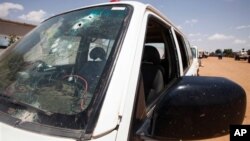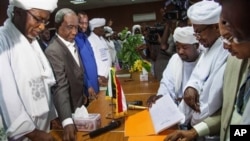NAIRONI —
Fighting has intensified in recent months in Sudan’s Darfur region, with hundreds of people killed in ongoing battles between rival Arab communities.
Observers say the government is losing control over the very militias they once armed to wage war against rebel groups.
According to the joint African Union-UN peacekeeping force in Darfur (UNAMID), some 300,000 people have been displaced by this new wave of tribal strife that has seen villages burn, markets close and people wounded.
Darfur has been a battleground between government forces and rebel militias since 2003, a conflict Khartoum sustained by providing arms to allied Arab tribes.
Abdullah Adam Khatir, a writer and analyst in Darfur, told VOA the current violence is a direct result of the government’s policies.
"Today, the same arms in the hands of these Arab tribes, they are pointed against each other," he said.
Much of the fighting has stemmed from disputes over natural resources in the area, including cattle and grazing land in East Darfur, gold in the North and gum arabic — an ingredient in colas — in the South.
Khartoum has sent delegates to engage in local mediation efforts aimed at finding a peaceful solution to the fighting.
The Sudan Tribune reported the governor of North Darfur State had negotiated a truce between members of the Maaliya and Rezeigat tribes in the North. But previous cease-fires have not held, and it is not yet clear if such a deal would also pacify East Darfur, the scene of the most recent fighting.
Khatir, the Darfurian writer, said citizens in the area are hoping for the best from these talks but said Khartoum has lost much of the influence it once had with its former allies.
"The government is just trying to pacify them whenever it's possible, but it cannot take the arms from them," he said. "It cannot take the power given to them."
In a press statement Wednesday, as reported by Radio Dabanga, East Darfur Governor Abdul Hamid Musa Kasha said the state is not in control of the situation and warned that because of an influx of fighters to the region, he expects the conflict to "explode at any moment."
UNAMID also has expressed concerns about rising tensions and has increased patrols on the ground in affected areas.
But the acting spokesperson for the force, Chris Cycmanick, said the peacekeepers will not become directly engaged in the fighting.
"One of the problems that we face is that we simply cannot become a party to the conflict," he said. "That is, if there are two groups that are fighting, if it’s tribal violence, we simply wouldn’t get in the middle of it. You know, we remain impartial."
The violence has also turned against the peacekeepers. The force says the most recent incident was August 12 when a mob in El Daein, the capital of East Darfur state, attacked a UNAMID patrol. Nobody was injured.
The conflict in Darfur began in 2003 when non-Arab rebels took up arms against the government, which they accuse of neglecting the region and hoarding power.
Hundreds of thousands of people have been killed in the conflict, while about 1.4 million of the displaced continue to live in camps.
Observers say the government is losing control over the very militias they once armed to wage war against rebel groups.
According to the joint African Union-UN peacekeeping force in Darfur (UNAMID), some 300,000 people have been displaced by this new wave of tribal strife that has seen villages burn, markets close and people wounded.
Darfur has been a battleground between government forces and rebel militias since 2003, a conflict Khartoum sustained by providing arms to allied Arab tribes.
Abdullah Adam Khatir, a writer and analyst in Darfur, told VOA the current violence is a direct result of the government’s policies.
"Today, the same arms in the hands of these Arab tribes, they are pointed against each other," he said.
Much of the fighting has stemmed from disputes over natural resources in the area, including cattle and grazing land in East Darfur, gold in the North and gum arabic — an ingredient in colas — in the South.
Khartoum has sent delegates to engage in local mediation efforts aimed at finding a peaceful solution to the fighting.
The Sudan Tribune reported the governor of North Darfur State had negotiated a truce between members of the Maaliya and Rezeigat tribes in the North. But previous cease-fires have not held, and it is not yet clear if such a deal would also pacify East Darfur, the scene of the most recent fighting.
Khatir, the Darfurian writer, said citizens in the area are hoping for the best from these talks but said Khartoum has lost much of the influence it once had with its former allies.
"The government is just trying to pacify them whenever it's possible, but it cannot take the arms from them," he said. "It cannot take the power given to them."
In a press statement Wednesday, as reported by Radio Dabanga, East Darfur Governor Abdul Hamid Musa Kasha said the state is not in control of the situation and warned that because of an influx of fighters to the region, he expects the conflict to "explode at any moment."
UNAMID also has expressed concerns about rising tensions and has increased patrols on the ground in affected areas.
But the acting spokesperson for the force, Chris Cycmanick, said the peacekeepers will not become directly engaged in the fighting.
"One of the problems that we face is that we simply cannot become a party to the conflict," he said. "That is, if there are two groups that are fighting, if it’s tribal violence, we simply wouldn’t get in the middle of it. You know, we remain impartial."
The violence has also turned against the peacekeepers. The force says the most recent incident was August 12 when a mob in El Daein, the capital of East Darfur state, attacked a UNAMID patrol. Nobody was injured.
The conflict in Darfur began in 2003 when non-Arab rebels took up arms against the government, which they accuse of neglecting the region and hoarding power.
Hundreds of thousands of people have been killed in the conflict, while about 1.4 million of the displaced continue to live in camps.

